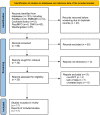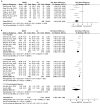The Impact of Mindfulness-Based Stress Reduction (MBSR) on Psychological Outcomes and Quality of Life in Patients With Lung Cancer: A Meta-Analysis
- PMID: 35837627
- PMCID: PMC9274275
- DOI: 10.3389/fpsyg.2022.901247
The Impact of Mindfulness-Based Stress Reduction (MBSR) on Psychological Outcomes and Quality of Life in Patients With Lung Cancer: A Meta-Analysis
Abstract
Objective: The impact of the mindfulness-based stress reduction (MBSR) program on psychological outcomes and quality of life (QoL) in lung cancer patients remains unclear. This meta-analysis aimed to evaluate the effectiveness of the MBSR program on psychological states and QoL in lung cancer patients.
Methods: Eligible studies published before November 2021 were systematically searched from PubMed, EMBASE, Cochrane Library, PsycINFO, China National Knowledge Infrastructure (CNKI), and Wanfang databases. The risk of bias in eligible studies was assessed using the Cochrane tool. Psychological variables and QoL were evaluated as outcomes. We used the Grading of Recommendations Assessment, Development and Evaluation (GRADE) system to grade the levels of evidence. Statistical analysis was conducted using RevMan 5.4 and STATA 14.0.
Results: A total of 17 studies involving 1,680 patients were included for meta-analysis eventually. MBSR program significantly relieved cancer-related fatigue (standard mean difference [SMD], -1.26; 95% confidence interval [CI], -1.69 to -0.82; moderate evidence) and negative psychological states (SMD, -1.35; 95% CI, -1.69 to -1.02; low evidence), enhanced positive psychological states (SMD, 0.91; 95% CI, 0.56-1.27; moderate evidence), and improved quality of sleep (MD, -2.79; 95% CI, -3.03 to -2.56; high evidence). Evidence on MBSR programs' overall treatment effect for QoL revealed a trend toward statistical significance (p = 0.06, low evidence).
Conclusion: Based on our findings, the MBSR program shows positive effects on psychological states in lung cancer patients. This approach should be recommended as a part of the rehabilitation program for lung cancer patients.
Systematic review registration: https://archive.org/details/osf-registrations-mwvbq-v1, identifier: 10.17605/OSF.IO/MWVBQ.
Keywords: lung cancer; meta-analysis; mindfulness-based stress reduction; physical and psychological wellbeing; quality of life.
Copyright © 2022 Tian, Yi, Liang, Gu, Peng, Chen and Jiménez-Herrera.
Conflict of interest statement
The authors declare that the research was conducted in the absence of any commercial or financial relationships that could be construed as a potential conflict of interest.
Figures





Similar articles
-
The use of mindfulness-based stress reduction (MBSR) for lung cancer patients: protocol for a systematic review and meta-analysis.Ann Palliat Med. 2021 Jul;10(7):8276-8282. doi: 10.21037/apm-21-194. Epub 2021 Jun 21. Ann Palliat Med. 2021. PMID: 34263645
-
The efficacy of mindfulness-based stress reduction vs. standard or usual care in patients with breast cancer: a systematic review and meta-analysis of randomized controlled trials.Transl Cancer Res. 2022 Nov;11(11):4148-4158. doi: 10.21037/tcr-22-2530. Transl Cancer Res. 2022. PMID: 36523321 Free PMC article.
-
The use of mindfulness-based stress reduction (MBSR) for breast cancer patients-meta-analysis.BMC Psychol. 2024 Nov 1;12(1):619. doi: 10.1186/s40359-024-02092-y. BMC Psychol. 2024. PMID: 39487509 Free PMC article.
-
Effectiveness of mindfulness-based stress reduction (MBSR) on symptom variables and health-related quality of life in breast cancer patients-a systematic review and meta-analysis.Support Care Cancer. 2019 Mar;27(3):771-781. doi: 10.1007/s00520-018-4570-x. Epub 2018 Nov 28. Support Care Cancer. 2019. PMID: 30488223
-
Effect of mindfulness-based stress reduction on stigma, coping styles, and quality of life in patients with permanent colorectal cancer stoma: A protocol for systematic review and meta-analysis.Medicine (Baltimore). 2022 Jan 7;101(1):e28421. doi: 10.1097/MD.0000000000028421. Medicine (Baltimore). 2022. PMID: 35029887 Free PMC article.
Cited by
-
Nonpharmacological Interventions for Management of the Pain-Fatigue-Sleep Disturbance Symptom Cluster in Breast Cancer Patients: A Systematic Review and Network Meta-Analysis of Randomized Controlled Trials.J Pain Res. 2023 Aug 7;16:2713-2728. doi: 10.2147/JPR.S409798. eCollection 2023. J Pain Res. 2023. PMID: 37577159 Free PMC article. Review.
-
Efficacy and mechanisms of 4-week MBSR on psychological distress in lung cancer patients: A single-center, single-blind, longitudinal, randomized controlled trial.Asia Pac J Oncol Nurs. 2022 Oct 13;10(1):100151. doi: 10.1016/j.apjon.2022.100151. eCollection 2023 Jan. Asia Pac J Oncol Nurs. 2022. PMID: 36406466 Free PMC article.
-
Effects of mindfulness-based stress reduction on quality of life of breast cancer patient: A systematic review and meta-analysis.PLoS One. 2024 Jul 19;19(7):e0306643. doi: 10.1371/journal.pone.0306643. eCollection 2024. PLoS One. 2024. PMID: 39028716 Free PMC article.
-
The cerebral metabolic mechanism of group computer magnanimous therapy based on magnetic resonance spectroscopy: effects on improving magnanimous-enterprising levels of lung cancer patients.Front Psychiatry. 2024 Dec 10;15:1397375. doi: 10.3389/fpsyt.2024.1397375. eCollection 2024. Front Psychiatry. 2024. PMID: 39720429 Free PMC article.
-
Recommendations for Interventions to Improve Function in Patients With Lung Cancer: A Clinical Practice Guideline.Cancer Med. 2025 Jul;14(13):e70626. doi: 10.1002/cam4.70626. Cancer Med. 2025. PMID: 40613665 Free PMC article. Review.
References
-
- Carlson L. E., Speca M., Patel K. D., Goodey E. (2004). Mindfulness-based stress reduction in relation to quality of life, mood, symptoms of stress and levels of cortisol, dehydroepiandrosterone sulfate (DHEAS) and melatonin in breast and prostate cancer outpatients. Psychoneuroendocrinology 29, 448–474. 10.1016/s0306-4530(03)00054-4 - DOI - PubMed
Publication types
LinkOut - more resources
Full Text Sources

